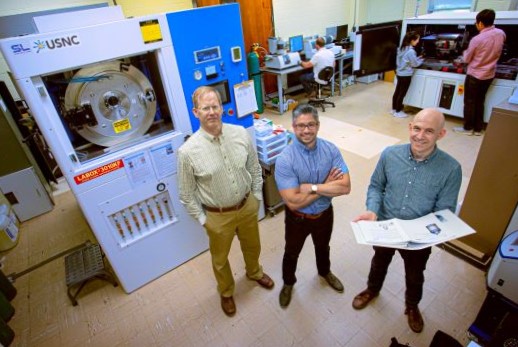Developing the Next Generation of Safe, Cost-Effective Nuclear Energy
Department of Materials Science and Chemical Engineering Team Receives $2.35 Million
ARPA-E Award
The team in the Engineered Microstructures and Radiation Effects Laboratory (EMREL), led by Principal Investigator (PI) Professor Jason Trelewicz and co-PI’s, Professor Lance Snead and Professor David Sprouster, has been awarded $2.35 million from the U.S. Department of Energy Advanced Research Projects Agency–Energy (ARPA-E) program, an agency tasked with promoting and funding research and development of advanced energy technologies.

Their project, Technology Enabling Zero-EPZ Micro Modular Reactors, will develop advanced moderator (Ad-Mod) technologies to increase the output of modular high temperature gas cooled reactors (HTGR) while also reducing the reactor footprint and overall costs of nuclear energy. The modular HTGR is considered inherently safe because of its negative reactivity temperature coefficients, its passive heat removal systems, and unique fuel designs. In addition, the high outlet temperature helium coolant can be used for hydrogen and synthetic fuel production, water desalination, or as process heat for industrial processes.
“Current technology utilizing graphite requires HTGR’s to be quite large,” according to Professor Trelewicz. “The solution being proposed by the EMREL team will deliver new materials with enhanced moderating powder to enable both size reductions and an increased capability for long-term flexible operation.”
The proposed innovation relies on engineered moderator materials, which will be encapsulated in a radiation-tolerant, high-temperature material to increase the structural strength of the moderator while maintaining thermal insulation characteristics resulting in adequately low temperatures. The impact of Ad-Mod technologies on the reactor safety case and long-term operation will be evaluated using validated models based on international benchmarks.
The award comes from ARPA-E's Modeling-Enhanced Innovations Trailblazing Nuclear Energy Reinvigoration (MEITNER) initiative, which seeks to identify and develop innovative technologies that can enable designs for lower cost, safer advanced nuclear reactors. These enabling technologies can establish the basis for a modern, domestic supply chain supporting nuclear technology. MEITNER projects will inform the development of lower cost, safe and secure advanced nuclear power plants.
All three investigators are part of the College of Engineering and Applied Science’s Department of Materials Science and Chemical Engineering. Professor Trelewicz is also a core faculty member of the Institute for Advanced Computational Science. The team includes collaborators in the Department of Nuclear Engineering at The University of Tennessee Knoxville and the Materials Science and Technology Division at Oak Ridge National Laboratories.
-Dick Wolfe
